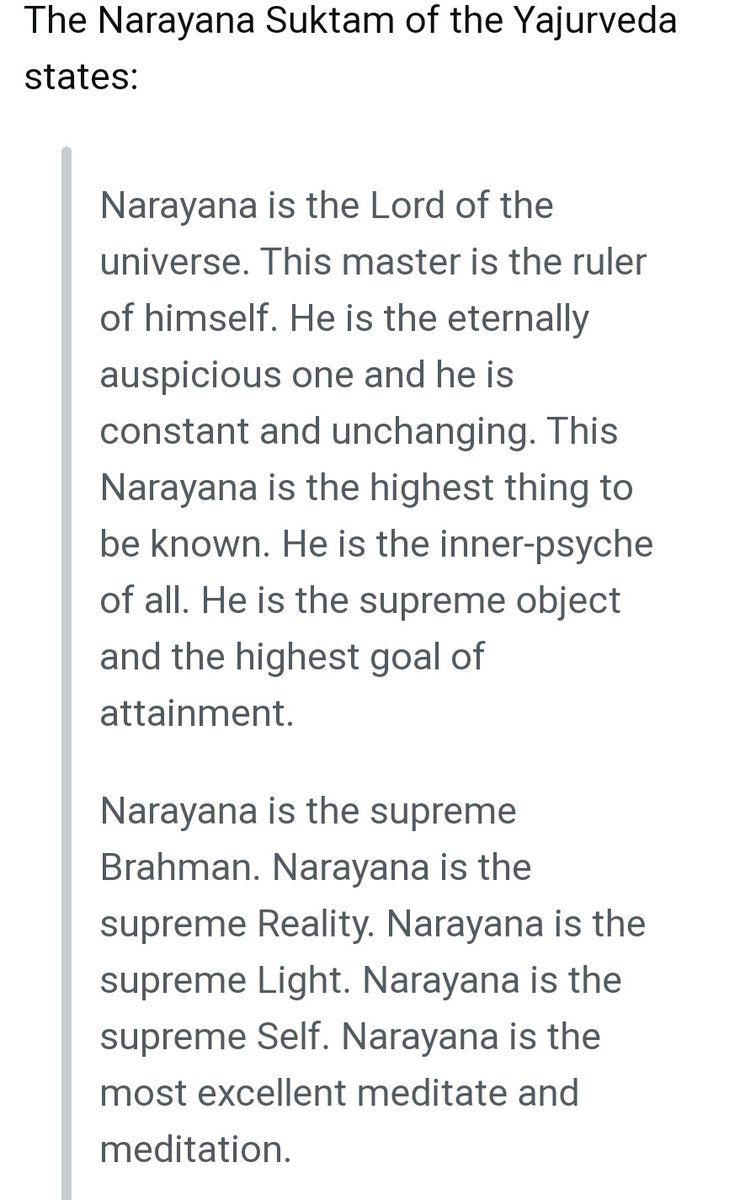
Did Vedas Decpict Lord Vishnu was not a prominent or Supreme god compared to Indra, and other vedic gods??
@TrueShoebill @hub_nationalist
@Dauhshanti @davidfrawleyved @ProfVemsani @hhrobbstark
@TrueShoebill @hub_nationalist
@Dauhshanti @davidfrawleyved @ProfVemsani @hhrobbstark
Vishnu (or Viṣṇu, Sanskrit: विष्णु) means 'all pervasive' and, according to Medhātith (c. 1000 CE), 'one who is everything and inside everything'.
scholar Yaska in the Nirukta defines Vishnu as viṣṇur viṣvater vā vyaśnoter vā ('one who enters everywhere'); also adding atha yad viṣito bhavati tad viṣnurbhavati ('that which is free from fetters and bondage is Vishnu').
Vishnu name in rig Vedic samhitas are used for two different deities. One for adityas and other for lotus feet, Sudarshan bearing Vishnu.
Vishnu who is one among the Adityas- one of the son of Aditi is not Lord Vishnu himself but the Vamana avatar which was born to Aditi
Vishnu who is one among the Adityas- one of the son of Aditi is not Lord Vishnu himself but the Vamana avatar which was born to Aditi
Although Surya may sometimes associated with Vishnu, that's why he also bears the name "Surya Narayan".
Rig Veda (1.22.20) makes it very clear that it is Vishnu who empowers all the heavenly Devas extolled and glorified in the Vedas.
Vishnu occupies the paramount position. All the other deities look always to His feet.
Vishnu occupies the paramount position. All the other deities look always to His feet.
Rig Veda 10.113.2 states:
Vishnu is glorified because of who and what He intrinsically is. Indra, on the other hand, is only glorious circumstantially.
Vishnu is glorified because of who and what He intrinsically is. Indra, on the other hand, is only glorious circumstantially.
Rig Veda 1.156.2 states:
Vishnu is the most ancient of all, yet also the most recent. Nothing and no one creates Vishnu, yet Vishnu creates everyone and everything.
Vishnu is the most ancient of all, yet also the most recent. Nothing and no one creates Vishnu, yet Vishnu creates everyone and everything.
Vishnu 12 among the Adityas is Vamana, while the yajnapati vishnu in rig Veda(Brahmana portion) is addressed to Laxmi Pati Vishnu, and Purusha Sukta is also addressed to Laxmipati Vishnu.
Aitareya Brahmana 1.1.1 –
agnirvai devanamavamo vishnuh paramah tadantara sarva devatah
“Agni is the lowest and Vishnu is the highest among devas. All other gods occupy positions that are in between.”
agnirvai devanamavamo vishnuh paramah tadantara sarva devatah
“Agni is the lowest and Vishnu is the highest among devas. All other gods occupy positions that are in between.”
Taittiriya Samhita 5.5.1 –
aniravamo devatAnAM viShNuH paramaH
Vishnu is the supreme amongst devatas.
aniravamo devatAnAM viShNuH paramaH
Vishnu is the supreme amongst devatas.
Vishnu is celebrated as yajnapati, in Vedas, purusha sukta also calls purusha as yajnapati as well as the husband of Laxmi which makes it clear that it is being addressed to Lord Vishnu.
• • •
Missing some Tweet in this thread? You can try to
force a refresh



